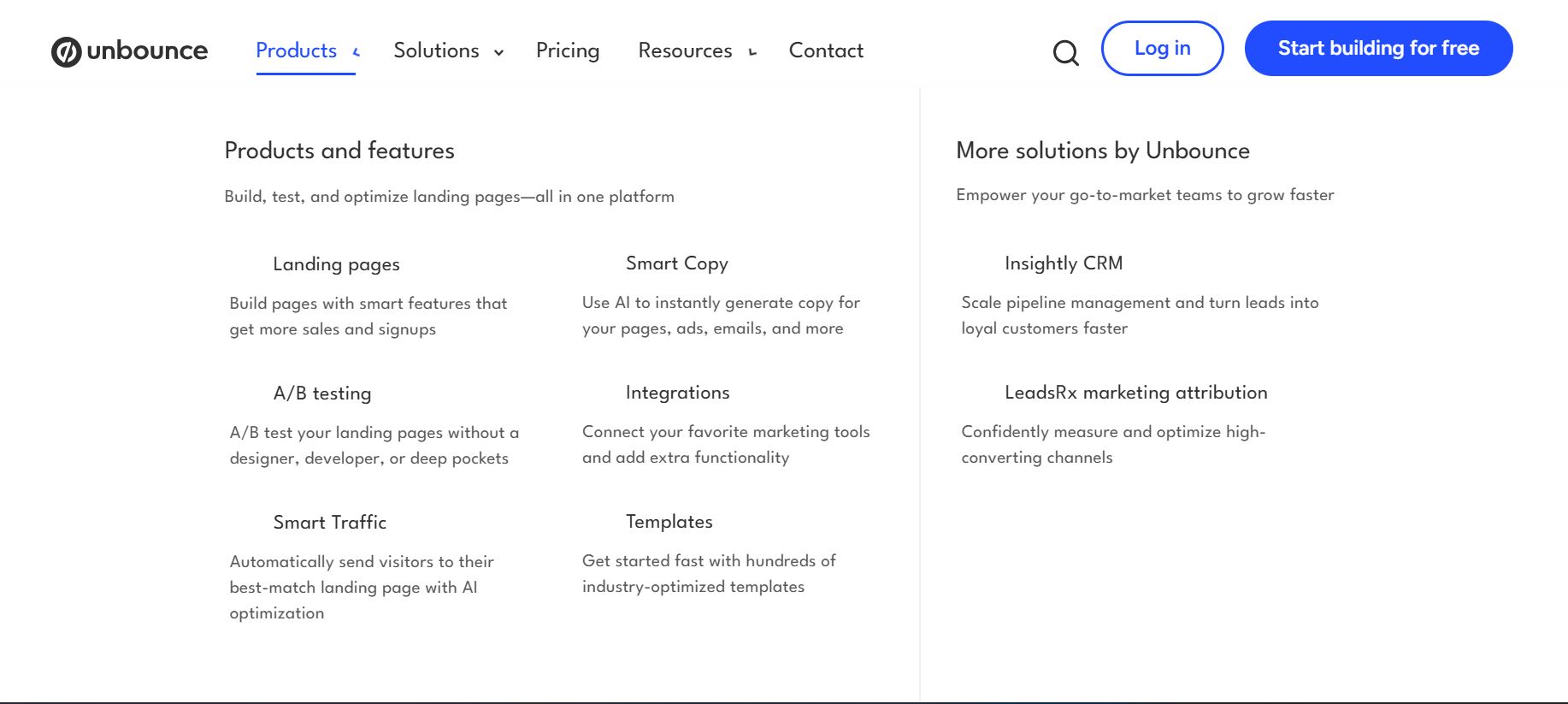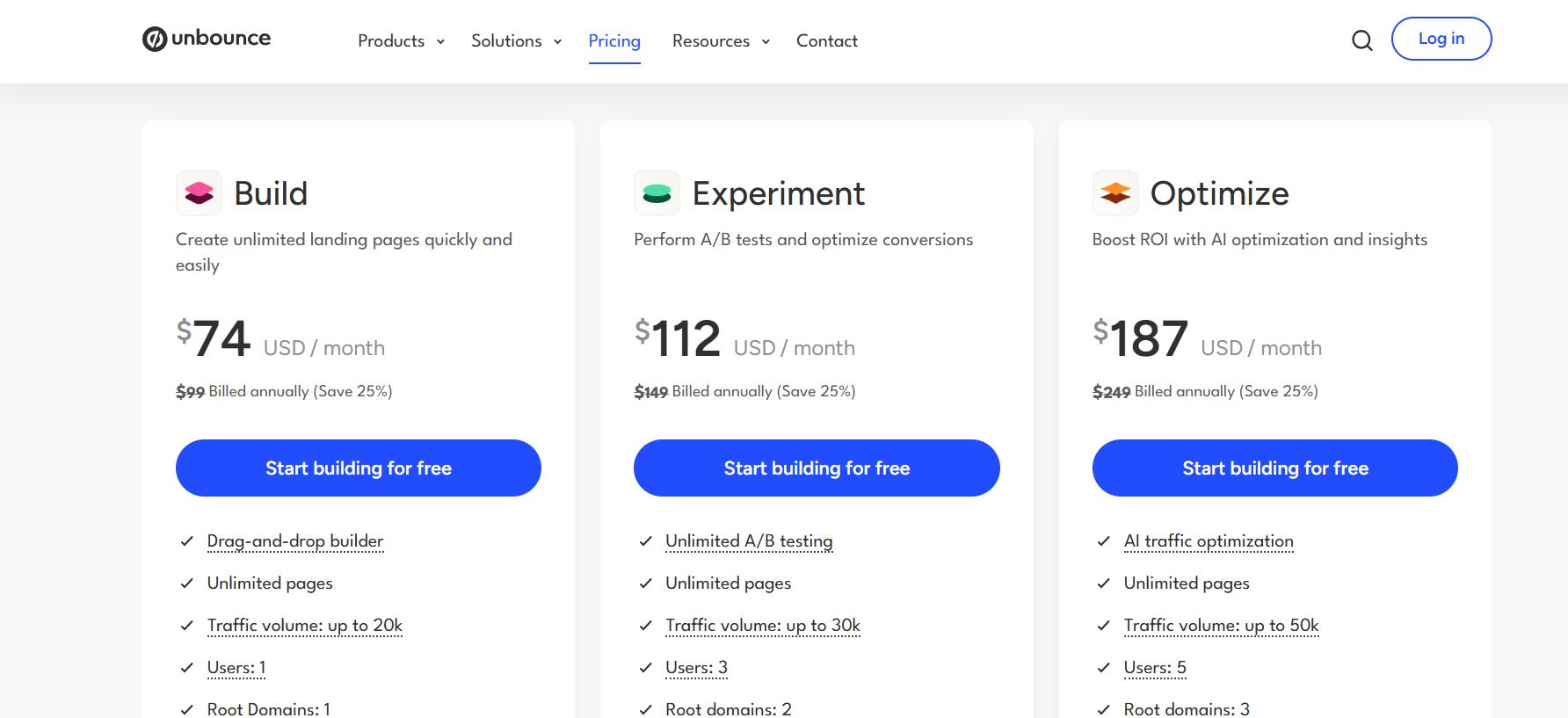If you’ve ever spent hours tweaking a landing page, only to see a disappointing conversion rate, you’re not alone.
That’s precisely where tools like Unbounce come in. It’s a landing page builder built to help marketers, business owners, and agencies create high-converting pages — without needing a developer.
In this review, I’ll break down everything you need to know—from Unbounce pricing to real Unbounce reviews, features, pros and cons, and whether it’s worth signing up.
Let’s dive in.
What is Unbounce
Unbounce is a landing page platform that helps you build, test, and optimize marketing that actually convert.
It’s known for its drag-and-drop builder, hundreds of ready-made Unbounce templates, and smart tools that help you get results fast.
You don’t need to know how to code. Just pick a template, drop in your content, and go live. Want to run A/B tests or use AI to write headlines? You can do that too.
One of Unbounce’s standout features is its Smart Builder, which uses AI to guide your design based on your goals.
It even offers dynamic text replacement — super useful if you’re running Google Ads and want to match landing page text to search keywords.
If you’re after faster load times, more conversions, and a smoother workflow — without rebuilding your entire website — Unbounce landing pages might be the way to go.
Unbounce Features
One of the best things about Unbounce is how packed it is with features — but without feeling overwhelming.

Here’s a closer look at what you get:
1. Drag-and-Drop Builder
You don’t need a developer to build a great Unbounce landing page. The editor is smooth, flexible, and lets you move things around easily, with no coding required.
2. A/B Testing
Want to know which version of your page works better? Just create variants and let Unbounce run the test. It’s a simple way to boost conversions without guessing.
3. Smart Traffic
This AI-powered tool learns which landing page works best for each visitor — and automatically sends them to the one most likely to convert. Less manual testing, more results.
4. Dynamic Text Replacement
If you run paid ads, this is a must-have. Unbounce automatically swaps out text based on a visitor’s search terms, helping match their intent and improve your ad relevance.
5. Pop-ups and Sticky Bars
Add extra offers, email opt-ins, or announcements — without interrupting the user experience. These tools are great for driving signups or promoting time-sensitive deals.
6. Mobile Optimization
Every Unbounce template is mobile-friendly. But you can also fine-tune layouts for smaller screens so your pages look great everywhere.
7. Template Library
With over 100 customizable templates, you’ll find options for SaaS, eCommerce, events, and more. Just plug in your content and publish.
8. Integrations
Unbounce plays nicely with major tools like Google Analytics, Zapier, Mailchimp, HubSpot, and even your favorite CRM. It’s easy to plug it into your workflow.
9. Analytics and Reporting
Track visitors, conversions, traffic sources, and more from your dashboard. The insights help you decide what’s working and what needs a tweak.
Whether you’re building your first landing page or managing multiple campaigns, these features help you move fast and make smarter marketing decisions.
Unbounce Pros
Unbounce is a powerful tool. While it may not be perfect, it shines in several key areas.
1. User-Friendly Interface
The platform is designed to be intuitive, so you can jump in and start building effective Unbounce landing pages even if you don’t have a technical background. The drag-and-drop builder simplifies the whole process.
2. Rapid Deployment
Need to create a landing page quickly? Unbounce lets you create and publish pages in record time, helping you accelerate your marketing campaigns without delays.
3. Extensive Customization
One of the biggest advantages is the level of flexibility. Whether you’re designing for eCommerce, a SaaS product, or a lead-generation campaign, Unbounce gives you plenty of room to tailor pages to your specific needs.
4. Effective A/B Testing
With Unbounce’s robust A/B testing tools, you can test various elements like headlines, images, and call-to-action buttons to determine what boosts conversions. This data-driven approach is vital for ongoing optimization.
5. Comprehensive Template Selection
Unbounce offers a wide range of templates for different industries and use cases, making it easy to find something that aligns with your business goals. Plus, they’re fully customizable, so you can make them your own.
6. AI-Driven Optimization
The Smart Traffic feature is powered by AI and does an excellent job directing visitors to the most relevant landing page variant based on their behaviors. This automatically improves your conversion rates.
7. Seamless Integrations
Unbounce works well with various tools, including Google Analytics, HubSpot, Zapier, and more. This ensures that your workflows stay efficient and that all your data remains in sync across platforms.
Unbounce Cons
Despite all the great features, Unbounce does have some drawbacks worth considering.
1. Pricing
One of the biggest concerns for users, especially smaller businesses and startups, is the pricing. With plans starting at higher tiers, the cost can be a hurdle for those on a budget.
2. Limited Advanced Features in Lower Tiers
Certain advanced functionalities, such as more in-depth A/B testing and premium integrations, are only available in the higher-tier plans. You may need to upgrade your plan if you want to scale your efforts.
3. Learning Curve for Beginners
While the platform is user-friendly, the range of features can be overwhelming for those new to landing page builders. It might take some time to fully grasp everything, especially if you’re used to simpler tools.
4. Split Testing Limitations
You can’t run A/B tests on landing pages created outside Unbounce. This means if you’ve already built a page elsewhere, you can’t use Unbounce’s powerful split-testing tools on it.
5. Customization Constraints
While Unbounce offers many customization options, you may hit some limits, especially when adding custom classes to buttons. This can be frustrating if you rely on advanced tracking or detailed customization.

Unbounce Pricing
When it comes to Unbounce pricing, there’s a clear structure based on the features you need.
- The build plan starts at $99 monthly, but the cost increases as your needs grow.
- The higher-tier plans, such as the Experiment and Optimize plan, cost $149 and $249 per month. These include advanced triggers and targeting, AI-powered tools, and increased page limits.
- Agency Plan features unlimited pages and collaborations at custom pricing.
The price can feel steep, especially if you’re a small business or just starting, but you’re paying for more than just a landing page builder.
The AI-powered features, analytics, and seamless integrations provide real value for marketers who need performance-boosting tools.
Unbounce offers a 14-day free trial, so you can try it out before committing to a subscription. For many, the ROI—when it comes to higher conversion rates—makes the investment worthwhile.
Visit Unbounce Pricing Page to learn more
Conclusion: Is Unbounce worth it?
Unbounce is worth considering if you’re serious about improving your landing page performance.
The platform’s features — from A/B testing to AI-driven optimization — provide a lot of power under the hood, especially if you’re running paid campaigns or want to maximize your conversion rates.
However, it’s not for everyone. The pricing could be a barrier for smaller businesses, and the learning curve might make it harder for beginners to get started.
But if you’re looking for flexibility, robust features, and tools to help you scale your marketing efforts, Unbounce delivers.
So, is it worth it? I’d say yes if you’re ready to invest in a tool that can seriously boost your landing page conversions.
Related Article: Leadpages Reviews: A Comprehensive Guide